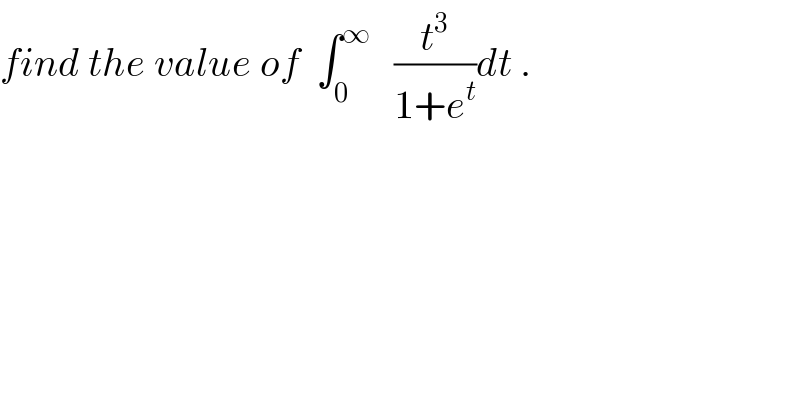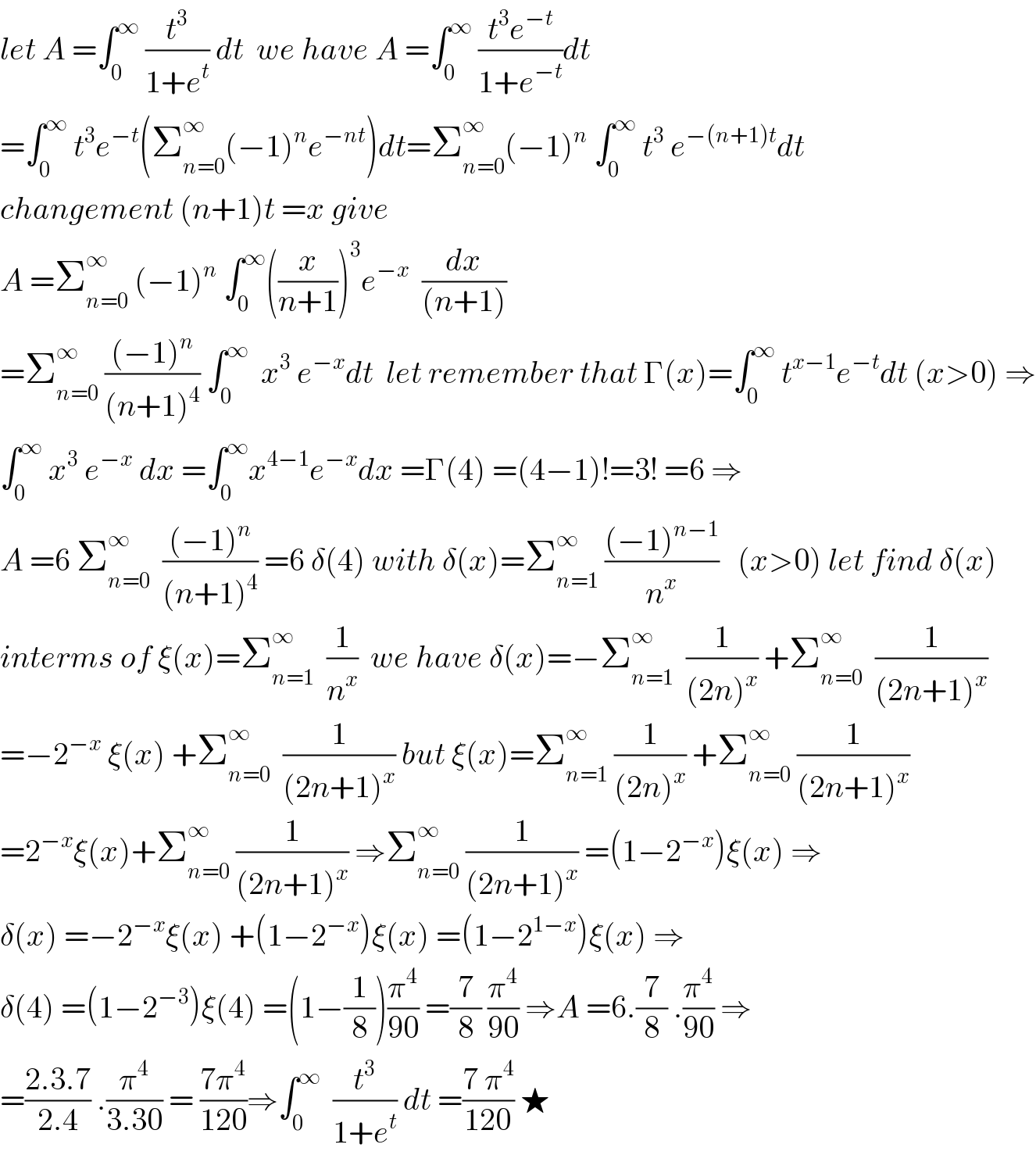Question Number 45045 by maxmathsup by imad last updated on 07/Oct/18

$${find}\:{the}\:{value}\:{of}\:\:\int_{\mathrm{0}} ^{\infty} \:\:\:\frac{{t}^{\mathrm{3}} }{\mathrm{1}+{e}^{{t}} }{dt}\:. \\ $$
Answered by maxmathsup by imad last updated on 09/Oct/18

$${let}\:{A}\:=\int_{\mathrm{0}} ^{\infty} \:\frac{{t}^{\mathrm{3}} }{\mathrm{1}+{e}^{{t}} }\:{dt}\:\:{we}\:{have}\:{A}\:=\int_{\mathrm{0}} ^{\infty} \:\frac{{t}^{\mathrm{3}} {e}^{−{t}} }{\mathrm{1}+{e}^{−{t}} }{dt} \\ $$$$=\int_{\mathrm{0}} ^{\infty} \:{t}^{\mathrm{3}} {e}^{−{t}} \left(\sum_{{n}=\mathrm{0}} ^{\infty} \left(−\mathrm{1}\right)^{{n}} {e}^{−{nt}} \right){dt}=\sum_{{n}=\mathrm{0}} ^{\infty} \left(−\mathrm{1}\right)^{{n}} \:\int_{\mathrm{0}} ^{\infty} \:{t}^{\mathrm{3}} \:{e}^{−\left({n}+\mathrm{1}\right){t}} {dt} \\ $$$${changement}\:\left({n}+\mathrm{1}\right){t}\:={x}\:{give}\: \\ $$$${A}\:=\sum_{{n}=\mathrm{0}} ^{\infty} \:\left(−\mathrm{1}\right)^{{n}} \:\int_{\mathrm{0}} ^{\infty} \left(\frac{{x}}{{n}+\mathrm{1}}\right)^{\mathrm{3}} {e}^{−{x}} \:\:\frac{{dx}}{\left({n}+\mathrm{1}\right)} \\ $$$$=\sum_{{n}=\mathrm{0}} ^{\infty} \:\frac{\left(−\mathrm{1}\right)^{{n}} }{\left({n}+\mathrm{1}\right)^{\mathrm{4}} }\:\int_{\mathrm{0}} ^{\infty} \:\:{x}^{\mathrm{3}} \:{e}^{−{x}} {dt}\:\:{let}\:{remember}\:{that}\:\Gamma\left({x}\right)=\int_{\mathrm{0}} ^{\infty} \:{t}^{{x}−\mathrm{1}} {e}^{−{t}} {dt}\:\left({x}>\mathrm{0}\right)\:\Rightarrow \\ $$$$\int_{\mathrm{0}} ^{\infty} \:{x}^{\mathrm{3}} \:{e}^{−{x}} \:{dx}\:=\int_{\mathrm{0}} ^{\infty} {x}^{\mathrm{4}−\mathrm{1}} {e}^{−{x}} {dx}\:=\Gamma\left(\mathrm{4}\right)\:=\left(\mathrm{4}−\mathrm{1}\right)!=\mathrm{3}!\:=\mathrm{6}\:\Rightarrow \\ $$$${A}\:=\mathrm{6}\:\sum_{{n}=\mathrm{0}} ^{\infty} \:\:\frac{\left(−\mathrm{1}\right)^{{n}} }{\left({n}+\mathrm{1}\right)^{\mathrm{4}} }\:=\mathrm{6}\:\delta\left(\mathrm{4}\right)\:{with}\:\delta\left({x}\right)=\sum_{{n}=\mathrm{1}} ^{\infty} \:\frac{\left(−\mathrm{1}\right)^{{n}−\mathrm{1}} }{{n}^{{x}} }\:\:\:\left({x}>\mathrm{0}\right)\:{let}\:{find}\:\delta\left({x}\right) \\ $$$${interms}\:{of}\:\xi\left({x}\right)=\sum_{{n}=\mathrm{1}} ^{\infty} \:\:\frac{\mathrm{1}}{{n}^{{x}} }\:\:{we}\:{have}\:\delta\left({x}\right)=−\sum_{{n}=\mathrm{1}} ^{\infty} \:\:\frac{\mathrm{1}}{\left(\mathrm{2}{n}\right)^{{x}} }\:+\sum_{{n}=\mathrm{0}} ^{\infty} \:\:\frac{\mathrm{1}}{\left(\mathrm{2}{n}+\mathrm{1}\right)^{{x}} } \\ $$$$=−\mathrm{2}^{−{x}} \:\xi\left({x}\right)\:+\sum_{{n}=\mathrm{0}} ^{\infty} \:\:\frac{\mathrm{1}}{\left(\mathrm{2}{n}+\mathrm{1}\right)^{{x}} }\:{but}\:\xi\left({x}\right)=\sum_{{n}=\mathrm{1}} ^{\infty} \:\frac{\mathrm{1}}{\left(\mathrm{2}{n}\right)^{{x}} }\:+\sum_{{n}=\mathrm{0}} ^{\infty} \:\frac{\mathrm{1}}{\left(\mathrm{2}{n}+\mathrm{1}\right)^{{x}} } \\ $$$$=\mathrm{2}^{−{x}} \xi\left({x}\right)+\sum_{{n}=\mathrm{0}} ^{\infty} \:\frac{\mathrm{1}}{\left(\mathrm{2}{n}+\mathrm{1}\right)^{{x}} }\:\Rightarrow\sum_{{n}=\mathrm{0}} ^{\infty} \:\frac{\mathrm{1}}{\left(\mathrm{2}{n}+\mathrm{1}\right)^{{x}} }\:=\left(\mathrm{1}−\mathrm{2}^{−{x}} \right)\xi\left({x}\right)\:\Rightarrow \\ $$$$\delta\left({x}\right)\:=−\mathrm{2}^{−{x}} \xi\left({x}\right)\:+\left(\mathrm{1}−\mathrm{2}^{−{x}} \right)\xi\left({x}\right)\:=\left(\mathrm{1}−\mathrm{2}^{\mathrm{1}−{x}} \right)\xi\left({x}\right)\:\Rightarrow \\ $$$$\delta\left(\mathrm{4}\right)\:=\left(\mathrm{1}−\mathrm{2}^{−\mathrm{3}} \right)\xi\left(\mathrm{4}\right)\:=\left(\mathrm{1}−\frac{\mathrm{1}}{\mathrm{8}}\right)\frac{\pi^{\mathrm{4}} }{\mathrm{90}}\:=\frac{\mathrm{7}}{\mathrm{8}}\:\frac{\pi^{\mathrm{4}} }{\mathrm{90}}\:\Rightarrow{A}\:=\mathrm{6}.\frac{\mathrm{7}}{\mathrm{8}}\:.\frac{\pi^{\mathrm{4}} }{\mathrm{90}}\:\Rightarrow \\ $$$$=\frac{\mathrm{2}.\mathrm{3}.\mathrm{7}}{\mathrm{2}.\mathrm{4}}\:.\frac{\pi^{\mathrm{4}} }{\mathrm{3}.\mathrm{30}}\:=\:\frac{\mathrm{7}\pi^{\mathrm{4}} }{\mathrm{120}}\Rightarrow\int_{\mathrm{0}} ^{\infty} \:\:\frac{{t}^{\mathrm{3}} }{\mathrm{1}+{e}^{{t}} }\:{dt}\:=\frac{\mathrm{7}\:\pi^{\mathrm{4}} }{\mathrm{120}}\:\bigstar \\ $$
